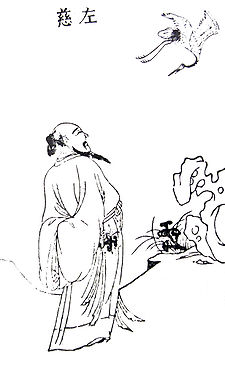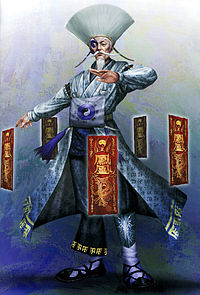- Zuo Ci
-
Zuo Ci Portrait of Zuo Ci in Sancai Tuhui Taoist Names Simplified Chinese 左慈 Traditional Chinese 左慈 Pinyin Zuǒ Cí Wade-Giles Tso Tz'ŭ Style name Yuanfang (元放) Zuo Ci is a legendary personage of the late Han Dynasty and Three Kingdoms periods of Chinese history. Though he is known as a local of Lujiang, the years of his birth and death are unknown. It is believed that he had existed before the collapse of the Han Dynasty, and it is claimed that he lived until the age of 300. He learned his magics and path to longevity from the Taoist sage Feng Heng (封衡), and eventually passed his arts to Ge Xuan.
Contents
In historical texts
Zuo Ci studied atop Mount Tianzhu, practiced medicinal alchemy and nourished his vital essence by controlled breathing and Taoist sexual practices. It is said that he could live for long periods without eating. He was also learned in the Confucian classics and in astrology.
At some time before 200, the local warlord Sun Ce, who was a strict Confucian, wanted to kill Zuo Ci and chased him on horseback. Zuo Ci, unmounted, still managed to escape by seemingly walking slowly.
Later, Zuo Ci went to Cao Cao, who granted him a pension to do his magics. Cao Cao may have shown an interest in the Taoist approach to longevity by doing this, but his son Cao Zhi wrote that the pensions are only intended to keep the magicians and their wild teachings under control. Zuo Ci performed a number of magic acts in Cao Cao's court, such as catching an exotic fish from an empty copper pan, and teleporting far away to buy ginger. Zuo Ci once fed a whole court assembly with food and wine, but Cao Cao soon found out that Zuo Ci had emptied every wine shop in the region with his magic for this purpose. Cao Cao tried to execute Zuo Ci, but Zuo escaped by walking through walls. When someone reported that Zuo Ci had been sighted in the market, everyone in the market became identical to Zuo's appearance. Another report said Zuo Ci went to the mountaintop, so Cao Cao and his men went, and realized Zuo was concealed among a flock of sheep. Knowing he could not find him, Cao Cao announced to the flock of sheep that he was merely trying to test Zuo Ci's skill, and had no intention to kill him. At the moment, a goat stood on its hind legs and spoke. Cao Cao's men rushed to the goat, only to find the rest of the flock also turned into goats and started standing and speaking like humans. Zuo Ci was never found by Cao Cao's men again.
Zuo Ci eventually retired from the world to practice his arts in the mountains.
In fiction
As described in Luo Guanzhong's historical novel Romance of the Three Kingdoms, Zuo Ci was a Taoist known under the name of Master Black Horn (烏角先生). Romance of the Three Kingdoms describes Zuo Ci's fictional attainment of Taoist powers and his subsequent mission to persuade Cao Cao to follow Taoism.
Zuo Ci wielded amazing Taoist power and was described as psychic. He studied on Mount Emei in Sichuan, where he found The Book of Concealing Method (遁甲天書), from which he learned to "ascend to the clouds astride the wind, to sail up into the great void itself;" and how "...to pass through mountains and penetrate rocks; ...to float light as vapor, over the seas, to become invisible at will or change [his] shape, to fling swords and project daggers so as to decapitate a man from a distance."
Zuo Ci offered Cao Cao the books if Cao himself became a disciple of Taoism. Cao Cao responded "Often have I reflected upon this course and struggled against my fate, but what can I do? There is no one to maintain the government," when Zuo Ci suggested Liu Bei and threatened Cao Cao, " I may have to send one of my flying swords after your head one day", Cao accused Zuo of being one of Liu Bei's agents, and threatened him. Zuo Ci openly mocked Cao Cao in court and Cao had him arrested; the guards beat Zuo cruelly, but the Taoist then fell asleep and slept soundly through the night. This enraged Cao Cao, who ordered Zuo Ci to be starved of food, this also failed as Zuo quite happily went seven days without food or water. After this Cao Cao could think of nothing else to punish Zuo Ci. When Zuo Ci appeared at Cao Cao's banquet, Cao tested him by asking to get, among other things, a dragon's liver, a peony, and perch from the Song River. Zuo Ci accomplished everything, which drew further suspicion from Cao Cao. Zuo Ci then offered a cup of wine to Cao Cao, who said that Zuo should taste first. Zuo Ci took a stick and divided the wine in half, and drank one half. Cao Cao was then enraged.
As a result, Cao Cao ordered Zuo Ci to be executed, but Zuo had disappeared. Cao Cao sent his general Xu Chu to capture Zuo Ci, Xu saw Zuo walking amongst a flock of sheep and slew the flock, thinking Zuo had become a sheep; when Xu had left the shepherd boy who had been tending the flock heard one of the sheep's heads telling him to place the heads next to the bodies to bring them back to life, the boy did this and the sheep returned to life. After Xu Chu failed to capture Zuo Ci, Cao Cao put out posters calling for Zuo Ci's capture, and as a result hundreds of men matching the exact description of Zuo were found, and Cao ordered them all executed. When they were all executed black vapor rose from their necks where they joined to form another image of Zuo Ci. The image summoned a crane for him to sit on, and Cao Cao had archers to shoot him down. Suddenly, a gust of wind brought the decapitated corpses back to life. The reanimated corpses carried their heads and started to beat Cao Cao. Cao Cao fainted due to the shock, the winds died down, and Zuo Ci disappeared along with the corpses.
Modern references
Zuo Ci is featured as a playable character in Koei's Dynasty Warriors and Warriors Orochi video game series.In the Shaw Brothers film Five Element Ninjas, Zuo Ci was briefly mentioned in the film for being a founder of Ninjutsu with his Taoist arts. It was said that he used them to trick Cao Cao during his battles. This is referenced in another Shaw Brothers film, The Weird Man, where he tricked Cao Cao with his sorcery and he was also Yu Ji's spiritual brother.
See also
- List of people of the Three Kingdoms
- List of Dynasty Warriors characters
References
- de Crespigny, Rafe (2007), A biographical dictionary of Later Han to the Three Kingdoms (23–220 AD), Leiden, The Netherlands: Brill, ISBN 978-90-04-15605-0.
- Ge Hong. Baopuzi.
- Luo Guanzhong. Romance of the Three Kingdoms.
- Fan Ye. Book of the Later Han, Volume 82, Part 2.
Prominent people at the end of the Han Dynasty (189–220) Emperors Warlords Cao Cao · Ding Yuan · Dong Zhuo · Gongsun Du · Gongsun Zan · Guo Si · Han Sui · Kong Rong · Li Jue · Liu Bei · Liu Biao · Liu Yao · Liu Yu · Liu Zhang · Lü Bu · Ma Teng · Sun Jian · Sun Ce · Sun Quan · Wang Lang · Yan Baihu · Yuan Tan · Yuan Shao · Yuan Shang · Yuan Shu · Zhang Jue · Zhang Lu · Zhang XiuAdvisors Generals Cao Hong · Cao Ren · Cao Zhang · Chen Dao · Cheng Pu · Dian Wei · Dong Xi · Gan Ning · Gao Shun · Guan Yu · Guan Ping · Han Dang · He Jin · Hua Xiong · Huang Gai · Huang Zhong · Huang Zu · Huangfu Song · Jiang Qin · Li Dian · Liao Hua · Ling Tong · Liu Feng · Lü Meng · Ma Chao · Pan Zhang · Pang De · Taishi Ci · Wei Yan · Wen Chou · Wen Pin · Xiahou Dun · Xiahou Yuan · Xu Chu · Xu Huang · Xu Rong · Xu Sheng · Yan Liang · Yu Jin · Yue Jin · Zang Ba · Zhang Fei · Zhang He · Zhang Liao · Zhang Ren · Zhao Yun · Zhou Tai · Zhou Yu · Zhu Huan · Zhu Ran · Zhu ZhiOthers Categories:- Chinese centenarians
- Han Dynasty Taoists
- Cao Cao and associates
Wikimedia Foundation. 2010.


